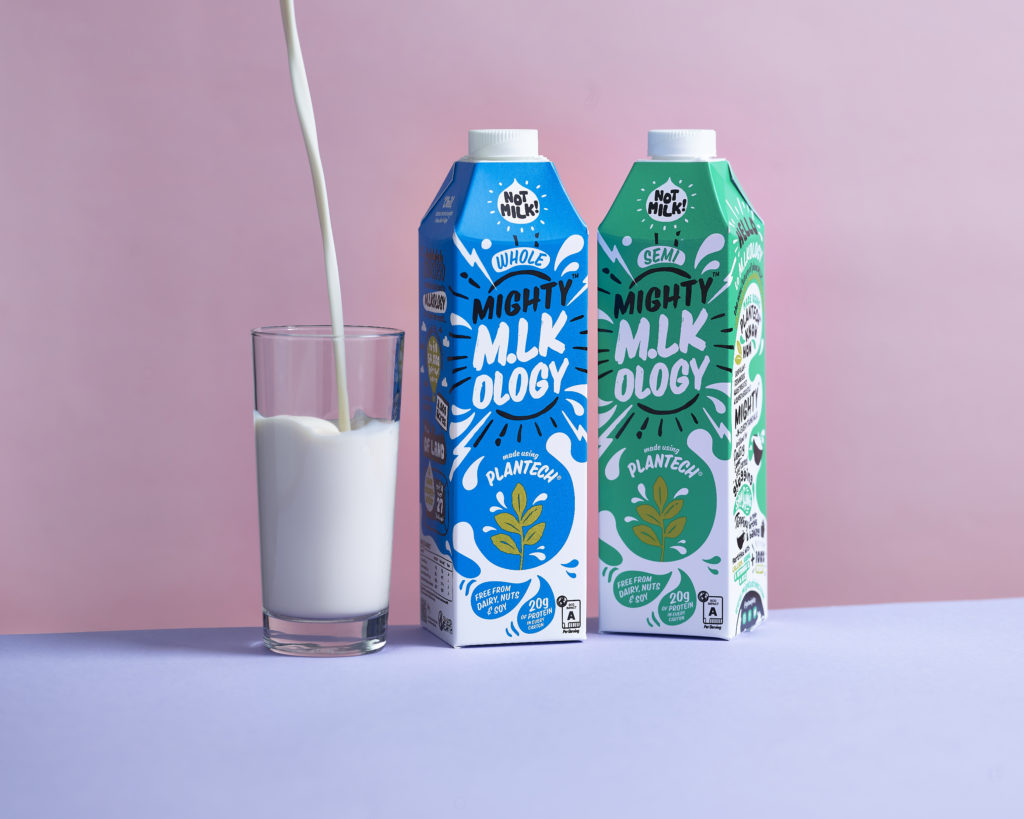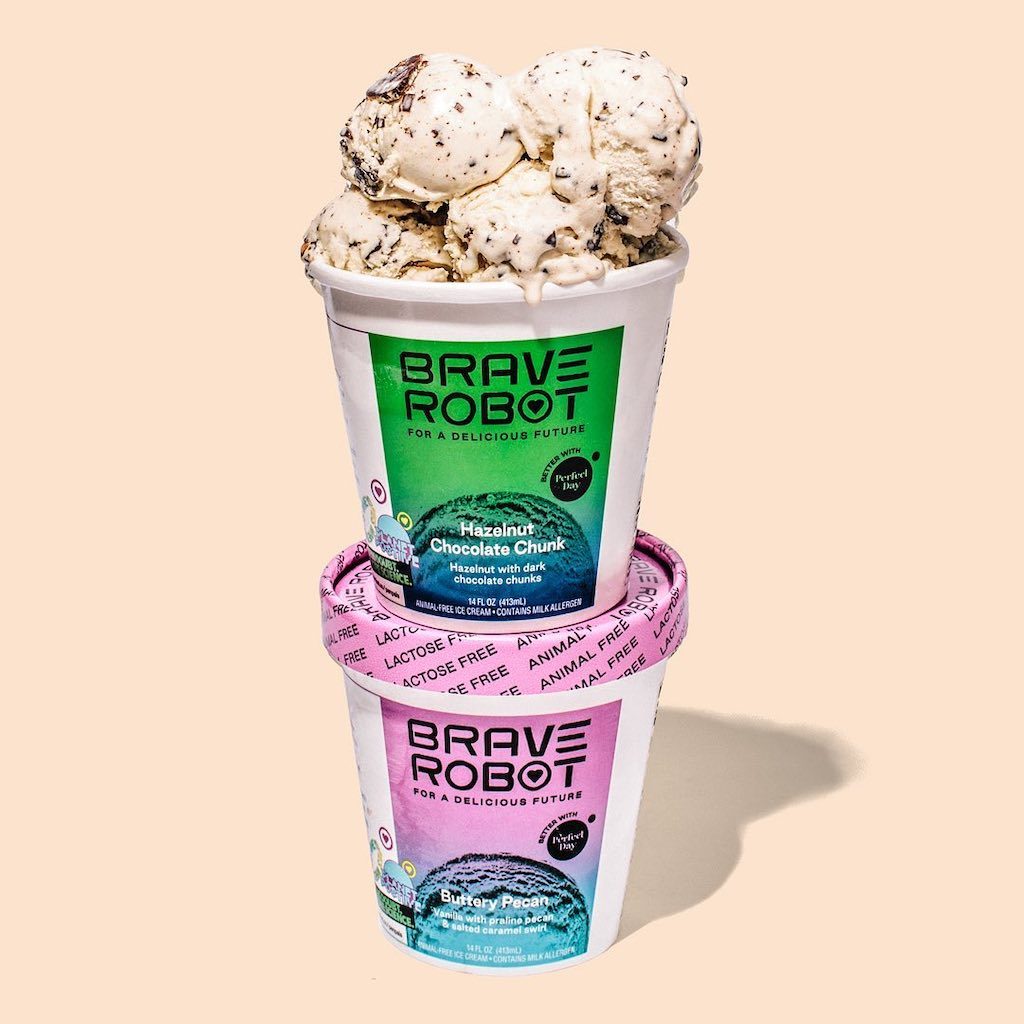A Centrist Approach to Animal-Free Dairy Might Be Best, New Research Finds
5 Mins Read
New research finds consumers are attracted to animal-free dairy when marketing emphasizes the environmental and ethical benefits, but not too much and not too little, either.
It’s a fine line for consumers weighing the benefits of animal-free dairy, (AFD) new research, published last month in the journal Frontiers in Nutrition found. According to the research, consumers are still sorting their opinions on animal-free dairy—products made via microbial fermentation that create proteins identical to dairy, not plant-based products such as oat milk. The research was conducted by Professor Garrett Broad of Rowan University, researchers from the animal rights group Mercy for Animals, and the animal-free dairy company, Formo.
The tech is used by a number of brands, chiefly the Bay Area-based Perfect Day, which uses microbial fermentation to create whey that’s used in a number of products from milk to cheese and ice cream. The tech is similar to producing beer or soy sauce, but in the case of producing dairy proteins, some consumers have found it offputting, preferring conventional dairy or conventional plant-based alternatives to the tech.
Animal-free dairy: are consumers ready?
“Significant questions remain about the potential future of AFD, including key questions about consumer understanding and interest. With that in mind, this study set out to use focus groups to explore basic consumer perceptions on the topic. Our initial research question sought to understand how respondents make sense of a basic technological description of the AFD process, interrogating the general valence of their reaction and the key questions that would arise in response,” the researchers noted.

The researchers also looked at how consumers responded to negative and positive arguments about animal-free dairy as well as the conceptual and practical elements of the methodological approaches employed.
Consumers still have a hard time separating animal-free dairy from genetically modified organisms—the tech used most often to make seed crops immune to heavier applications of herbicides. The most common GMO crops include soy, corn, cotton, alfalfa, and rapeseed.
But while consumers were somewhat confused and concerned about the GMO link, the researchers also found they supported the use of tech to solve food system problems, such as creating a more sustainable and ethical milk product. But the biggest concerns were taste and value.
Is microbial fermentation the same as genetic modification?
According to the paper, following the June release of CO2COA, a joint chocolate venture from confectionery giant Mars and Perfect Day, The Non-GMO Project held a webinar challenging the safety of the product.
Entitled “How do you milk a microbe? How synbio is disrupting the dairy industry,” the webinar saw panelists challenge the tech, criticizing its lack of transparency, and suggesting there could be risks to human health and the environment. “These new GMOs are largely unregulated and unlabeled, and they’re flying under the radar of the natural products industry,” read the event’s marketing materials.

The researchers say the aim of the paper was to further explore consumer opinions around the category.
“Making great cheese means nothing if people don’t value it, or worse, are scared of it,” said Oscar Zollman Thomas, Formo’s lead researcher on the project. “We’re very proud to help push forward everyone’s understanding of precision fermentation and how it can change where we get our protein from.”
The results show a general consensus leading toward cautious openness surrounding animal-free dairy. “Outright opposition to the concept was rare, but so too was unabashed enthusiasm,” the researchers said.
“Instead, respondents had a number of questions about the nature of the technological process, its overall safety and regulatory standards, its potential contributions to individual health and climate change mitigation, as well as its organoleptic qualities and price to consumers. Through these conversations, they grappled with their own ambivalence about eating animal products, as well as their mixed feelings regarding the role of technology in food. They pushed back against what they felt were overly hyperbolic claims, both in favor of and against AFD, and called for transparent communication from all parties,” the researchers noted.
Changing perceptions about the food system
“Participants tended to understand that much of the food we eat today has changed over time, and saw challenges to small-scale food producers as long-standing, subject to global trends, and often due to competition with industrial food producers, not alternative protein products,” the researchers said. But they note that most participants doubted that AFD would become a dominant part of the dairy market in the years ahead, but could see it finding some consumer base, if it tasted good enough and its claimed benefits could be verified.

“Lingering concerns about the role and impacts of genetic modification were present as well, and while analogies to beer brewing and other traditional forms of fermentation were seen as assuring for many, some still had their reservations, and could see how any mention of ‘genes’ might be a deal breaker for other people in their social orbit.”
For the industry, this research shows the need for “thoughtful and inclusive discourse.”
“In this way, companies should understand their role not merely as contributors to already packed grocery aisles, but also as participants in a discussion about our relationship with the food we eat and the future of food system reform. Specifically, the importance of transparency and clarity was apparent throughout the process,” the researchers noted.
“Although focus group participants did see a significant role for regulators and retailers in helping them gauge the safety of novel food products like AFD, companies would be wise to proactively engage with consumers to explain the nature of precision fermentation and the principles of synthetic biology underlying it, as well as advocate for robust and trustworthy official regulatory processes.”
Lead image courtesy Formo.




